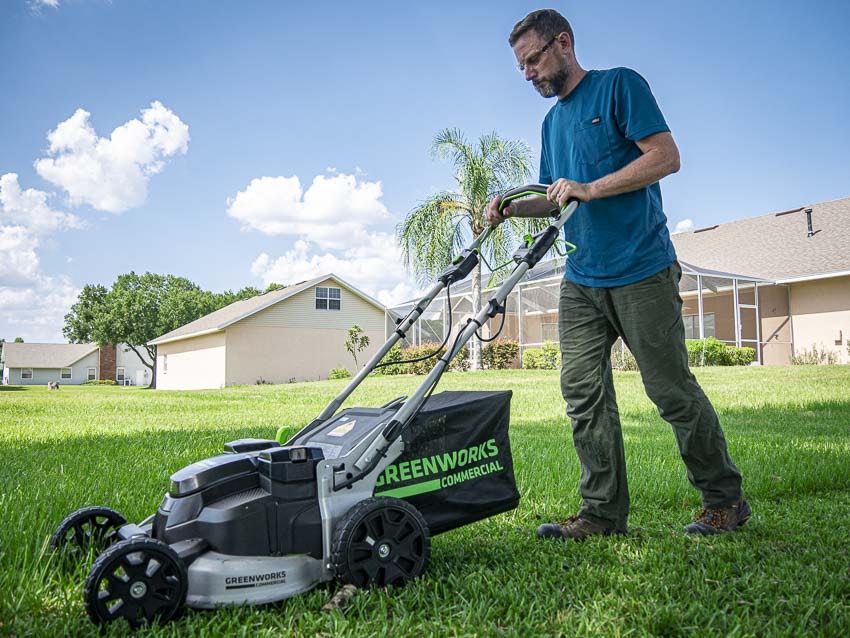Switching from Gas to Battery-Powered Lawn Care Equipment Is Becoming a Reality for More Commercial Pros
As our culture continues to look for ways to turn away from fossil fuels to cleaner energy, outdoor power equipment is squarely in the crosshairs for many individuals and organizations. Switching from gas to battery-powered lawn care equipment is one thing for homeowners, but presents more challenges for Pros.
We got on the horn with the team at Greenworks to see how they address some of those concerns as they continue developing their commercial line of battery OPE.
Switching from Gas to Battery-Powered Lawn Care Equipment
Overcoming the Hurdles
We started with a conversation about the most common objections to switching from gas to battery-powered lawn care equipment.
It’s really the educational process of understanding the run time and power of battery products. We see it frequently when we put high-performance cordless products in the hands of someone for the first time. It’s clear that today’s battery equipment is far beyond what we had even a few years ago.
If you’re curious, Greenworks Commercial’s dealer network has literature that helps compare run time and understand what smart lithium-powered products allow you to do on your job sites.
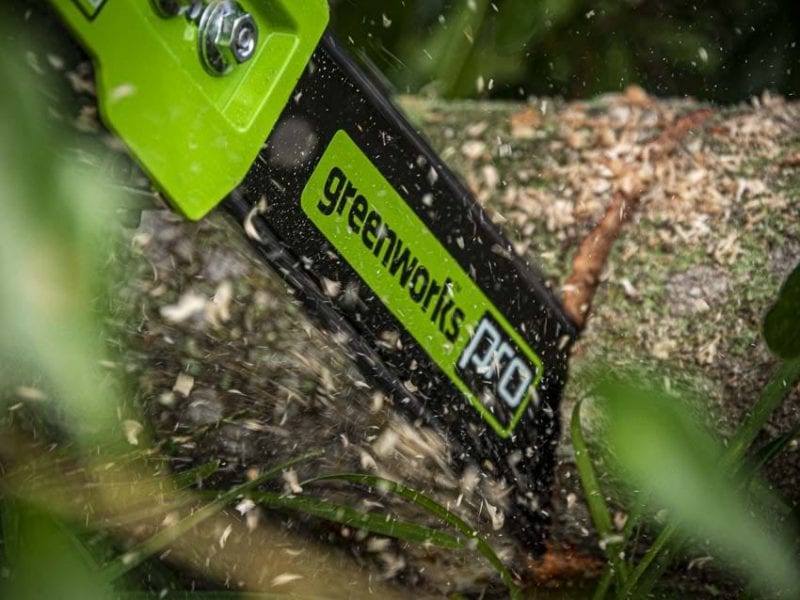
They’re also in the process of designing and developing apps. These help you understand the condition, charge status, and location of your battery tools. That’s one area that helps with productivity and efficiency that gas can’t offer.
Low-Hanging Fruit
Some lawn care equipment is more powerful than others. That’s obvious just looking at the engine sizes on what you’re currently using. It’s no surprise that tools such as battery hedge trimmers and string trimmers were some of the first legitimate commercial options. Is everything on your trailer ready for a battery power source, though?
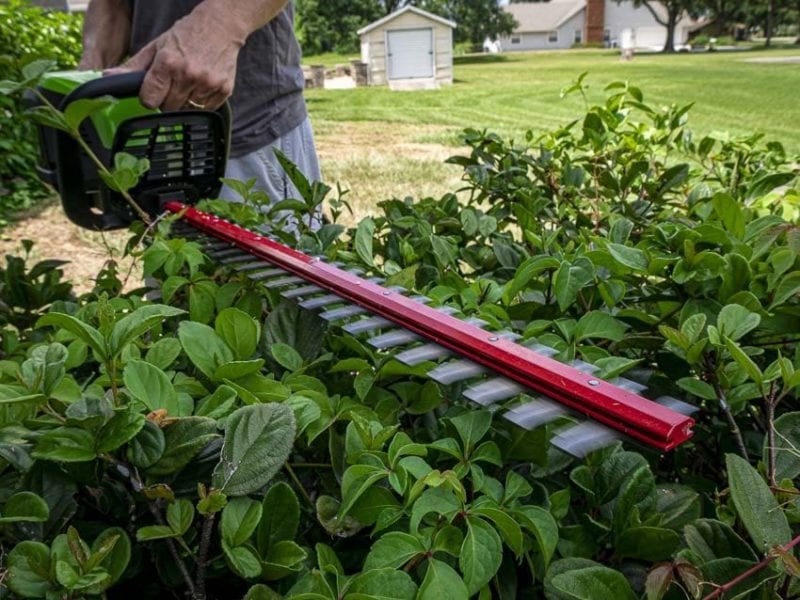
The Greenworks team believes the entire residential OPE segment has already jumped into the commercial segment of the business. High-voltage platforms such as their 82V commercial line have given professional landscapers the power and run time to fully replace all of their gas-powered products.
Tougher Tasks
When we think of the tougher tools to make the leap from residential to commercial battery power, we immediately go to zero turn mowers and the blowers. That’s one of the areas the Greenworks team is considering as well.
Their 82V Lithium Z stand-on and ride-on mowers along with their UTV are examples of the ability to develop products for commercial crews. They typically want to mow with battery-powered products. However, there are still some segments, such as pavement blowers, that require massive battery capacity. Those products are slated for the future.
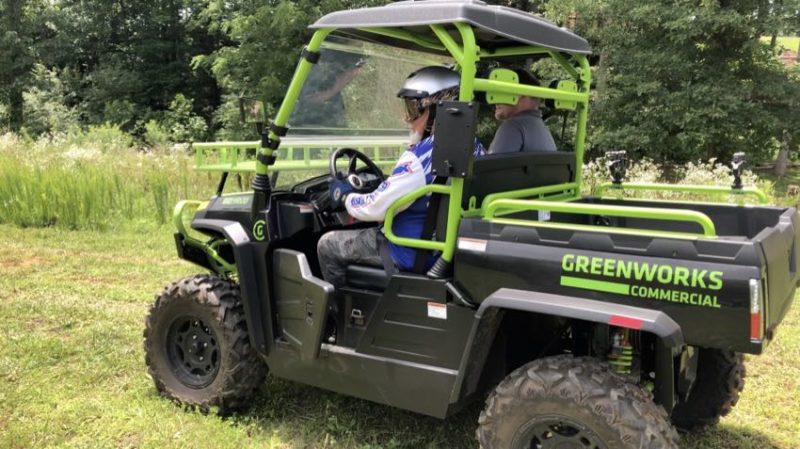
Visualizing the Loadout
What does a commercial trailer look like when you’re switching from gas to battery-powered lawn care equipment? It’s not that much different in the tools you carry. It’s really just a different power source.
Looking at the Greenworks Commercial line, they can replace every tool the landscaper has on their trailer with battery products. You’d have a stand-on or ride-on zero turn mower, trimmer, backpack and handheld blowers, edger, and walk-behind mowers.
It’s really a matter of carrying the right number of batteries. You need everything you plan to use on the job throughout the day. This works the same as carrying cans of gas today.
On-the-go charging might be an option. However, you have to include the time needed to cool a hot battery. You should also factor in recharge time and the potential of not having a charged battery to complete your work. There are some solar truck options that help with this. However, the best situation currently is to leave the shop with the correct number of batteries to complete your entire day.
ROI
One of the challenges of switching from gas to battery-powered lawn care equipment is the upfront cost. Battery OPE typically has a premium price over its gas counterparts.
It’s true that the initial cost of battery products is greater than gas. You’re essentially buying all of your “gas” up-front in the form of your batteries. Over the lifetime of the equipment, manufacturers such as Greenworks are confident you’ll see the cost of battery equipment wind up less than gas models.
When you consider how all that adds up, take your upfront costs, fuel costs, and maintenance costs over the life of each product. If you’d rather not do the math yourself, Greenworks’ dealers have literature that can help you see the long-term ROI on their commercial products.
Gaining Momentum
We asked the team about areas of the country that are seeing higher adoption rates for battery-powered lawn equipment. It’s impressive to see how widespread it is for commercial crews.
According to their data, Greenworks is now seeing that the battery transition is occurring all around the country. There are now more than 500 towns and cities that have some form of ban or reduction in the use of gasoline outdoor products.
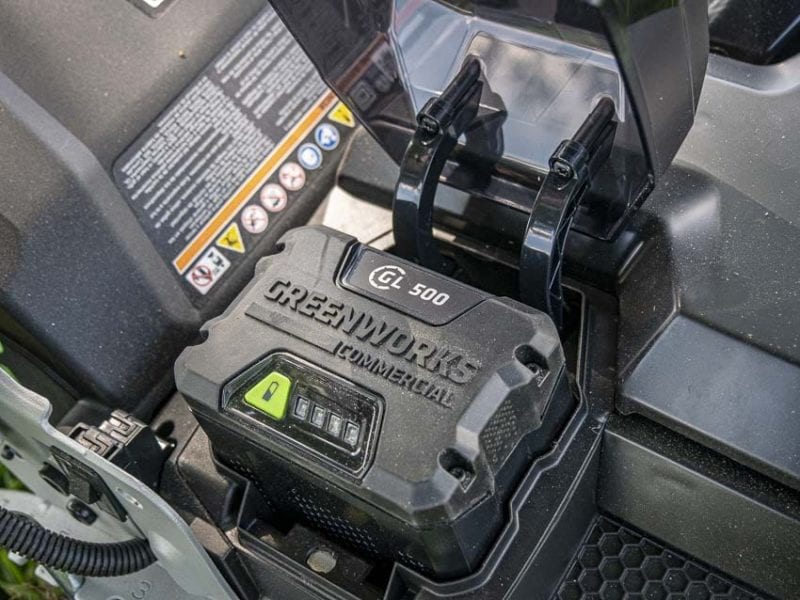
The state of California is considering an outright ban of all two-stroke and four-stroke outdoor power. Recently, the state of Illinois started considering a ban on all gas blowers and they have passed legislation eliminating small gas engines in 2024. You can expect this momentum to continue and even accelerate in the future.
As far as areas that are slow to adopt, town, municipal, collegiate and corporate properties are driving the change and there aren’t many areas that are unaffected.
Parting Thoughts
No matter who we talk to, the message we’re consistently receiving is that battery-powered OPE is well on its way to replacing gas. It’s exciting to see new products come to market that can legitimately replace the gas-powered equipment we’re already using.
It’s an easier switch for homeowners who don’t need the same power and run time as commercial crews. The gap is closing and even though the products aren’t as widespread, there really do seem to be options for Pros that want to ditch gas.
There’s some anxiety, of course. Any change of this magnitude is going to be easier for some than others. At the end of the day, it’s your call. Give battery-powered commercial equipment a shot and find out for yourself.
Let us know what you think of the battery-powered revolution in the comments below!

